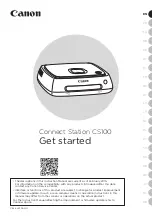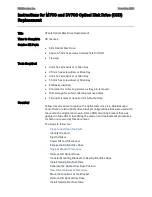
Table 32. Default settings (continued)
Parameter
Default
Configuration
Reset Default
Settings
Empty Slot/Unlabeled
Cartridge Detection
Enabled
x
Management GUI Timeout
30 minutes
x
Drive Defaults
Drive speed and topology
settings
Automatic/Automatic
x
Odometer
Enabled
NOT reset
Methods of cleaning drives
Automatic cleaning of tape drives is disabled by default in the library. However, automatic cleaning of
tape drives is recommended for this library. It is also possible to initiate manual or host cleaning
methods.
The head of every tape drive in the tape library must be kept clean to prevent errors that are caused by
contamination. To help you keep the drives clean, IBM provides a cleaning cartridge with the library. The
library uses the cleaning cartridge to clean the drive with whatever cleaning method that you choose. In
all methods, cleaning is done after the data cartridge is unloaded from the drive and before the next load.
If you put the cleaning cartridge into a storage slot that is assigned to a logical library, it is visible to any
hosts that are associated with that logical library. If you don't want the cleaning cartridge visible to any
hosts, put it into a storage slot that is not assigned to any logical libraries.
It is the operator’s responsibility to monitor cleaning cartridge usage and replace cleaning cartridges as
necessary. This tape library provides multiple ways to monitor and manage cleaning cartridges. If SNMP
traps are enabled, a trap is generated when a cleaning cartridge expires. It is also possible to use the
Management GUI to monitor the cleaning cycles that remain on a cleaning cartridge.
Three methods of cleaning are available.
Automatic cleaning
Automatic cleaning enables the library to automatically respond to any tape drive's request for
cleaning and to begin the cleaning process. The cleaning process is transparent to any host
application that uses the library.
Select Auto Clean to enable the auto cleaning feature. When enabled, the library automatically
initiates a cleaning operation when media is unloaded from a drive that requires cleaning instead of
creating a warning event when a drive requires cleaning. For reliable operation, enable Auto Clean for
each logical library and ensure that the library has a valid cleaning cartridge.
It is preferred to put the cleaning cartridge into a storage slot that is not assigned to a logical library. If
you put the cleaning cartridge into a storage slot that is assigned to a logical library, it is visible to any
hosts that are associated with that logical library. If you don't want the cleaning cartridge to be visible
to any hosts, put it into a storage slot that is not assigned to any logical libraries.
When a cleaning operation is initiated, the library first attempts to use an unexpired cleaning cartridge
from the same logical library as the tape drive. If the logical library does not contain an unexpired
cleaning cartridge, the library attempts to use an unexpired cleaning cartridge from a storage slot that
is not assigned to a logical library. The library does not use a cleaning cartridge from a different logical
library. When auto cleaning is enabled, ensure that each logical library has an unexpired cleaning
cartridge. Or, place at least one unexpired cleaning cartridge into a storage slot that is not assigned to
a logical library.
After the initial configuration, Auto Clean can be turned on or off by accessing the Logical Library
Wizard Expert Mode.
72 IBM TS4300 Tape Library Machine Type 3555: User's Guide
Summary of Contents for TS4300 3555
Page 1: ...IBM TS4300 Tape Library Machine Type 3555 User s Guide IBM SC27 4629 07...
Page 66: ...Chapter 3 Installing 36 IBM TS4300 Tape Library Machine Type 3555 User s Guide...
Page 77: ...Figure 38 Mounting the rails to the connectors Chapter 3 Installing 47...
Page 175: ...Figure 81 Unlocked spooling mechanism enlarged view Chapter 6 Upgrading and servicing 145...
Page 261: ......
Page 262: ...IBM SC27 4629 07...
















































